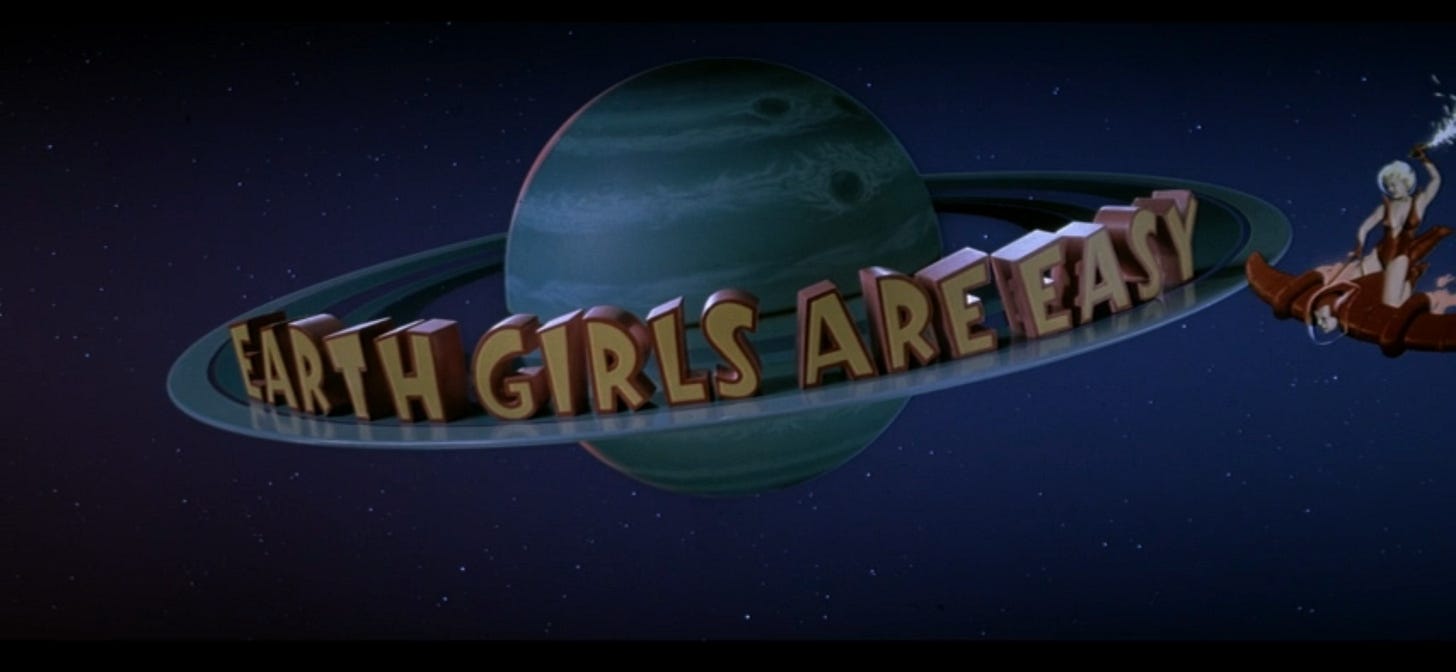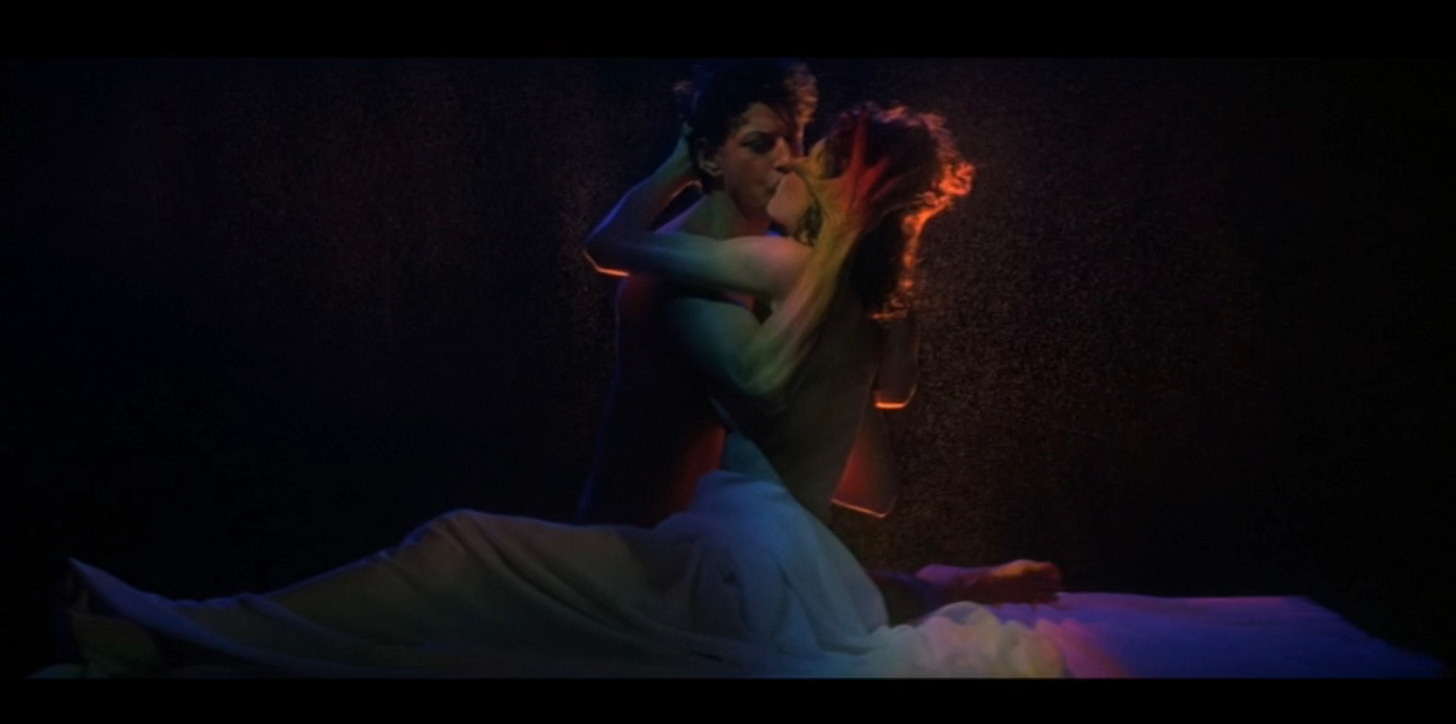Earth Girls Are Easy is one of those movies I missed out on, and that’s partially why I chose it as my first DVD close watch. It was not a box office success but the movie is a cultural touchstone, a staple of late night movie marathons and cult film programming that I had somehow never seen until the pandemic. It was not a good movie to watch in the bitter cold of an isolated Minnesota winter—a movie about physical touch and connection during our collectively touch-starved era. And so it struck me as nothing special, another one of those pointlessly horny ‘80s movies that I didn’t see young enough to appreciate.
But on a recent rewatch, I really dug this movie and saw a few things I had missed at first—specificities that distinguish Earth Girls from other raucous sex comedies of the era. First, though the movie does have a few musical numbers, it’s the intricate, splashy art direction that most reminds me of a musical. There is not a single corner of this movie that isn’t precisely styled—the tiled operating room of the “Our Lady of the Valley” hospital, the chrome lazy susan inside of Valerie’s pastel fridge. When people say “they don’t make ‘em like this anymore,” this is what they’re talking about. Now you watch a movie, you see everyone in the same jeans.
The second thing is the romance between Geena Davis (Valerie) and Jeff Goldblum (Mac). I’m not just talking about their obvious chemistry (see image below), but their individual characterizations and performances. Davis wasn’t a valley girl, something writer and actress Julie Brown who’d helped codify the trope, was quick to mention in her commentary track. It’s Brown who plays the stereotypical valley girl, Valerie’s best friend Candy.1 And Valerie doesn’t feel like a born-and-bred girl from the valley. It’s easy to imagine her as a transplant who wound up here for some long-forgotten reason, the same way she found herself in a terrible relationship with a loser. It makes sense that she would connect with a fellow outsider and be willing to leave her world behind. Davis plays Valerie straight, with an endearing, total earnestness. Her sweetness obscures that she has no idea what she wants, outside of being a good wife to her awful fiancé.
Brown was devastated that Davis got the part she’d written for herself. The studio wouldn’t make the movie without a star attached, so Brown could either concede, and write in the character of Candy for herself, or stop the production entirely. I’m curious about what Brown’s original vision was, but I think Davis’s casting makes the movie work. Valerie might lose some of her specificity by distancing her from her valley girl origins, but this is already a movie musical about sex with aliens. I think it’s specific enough.
Goldblum, an actor normally reliant on hyper-loquaciousness, barely speaks as Mac. The majority of his dialogue consists of lines repeated from movies he’s just watched;2 most of his interactions with Valerie are him watching and listening, her doing and talking. “We were trying to write the ideal guy,” Brown explains in the commentary track. She mentions the women’s self-help craze of the time, positioning Mac as a romantic ideal within a time where women could newly expect more from their male partners but weren’t sure how to. He’s a character with no flaws, a flat surface with just enough edges so that whatever Valerie projects onto him appears convincingly three-dimensional. There’s only one scene where we see some of Mac’s personality and it’s an act of heroic self-sacrifice, his willingness to give Valerie up so she can have the normal picket fence life she’s trying to build.
I read a bunch of contemporary romance novels for a piece I’m working on (out in April!) and Mac’s characterization reminded me of many of the male leads. You almost certainly know someone who has read one of the Ice Planet Barbarian Books3, which places giant blue aliens who are definitely not the giant blue aliens from Avatar in monogamous coupledom with regular human women. This is an incredibly popular dynamic in contemporary romance fiction: a powerful, supernatural boyfriend whose sole desire is a life of missionary position with a glasses-wearing normal. If you look past the era trappings, the time Earth Girls came out shares a lot with our current moment: an era of excessive consumerism, extreme political conservatism, and widespread backlash to feminist progress. Mac was Brown’s conception of a man who could exist outside of numb-skulled ‘80s masculinity—and the only way to make him seem realistic was to make him extraterrestrial.
Which brings me to the third charm of Earth Girls: Julie Brown. Brown’s script is both an indulgence in and an indictment of the empty shallowness of ‘80s mass culture—the American Express earrings, the fridge stocked with processed food—and explores how this superficiality infiltrated the desires of valley women. This was her stand-up act. Julie Brown was a girl from the valley who’d been doing comedy about her compatriots before the Zappas4 or Clueless (which she appears in as the gym coach, the “balls in her face” scene). Like a true ‘80s legend, she had a daffy MTV show which, like much of her comedy, is a little too era-specific to translate in 2025.5 Brown feels like an obvious predecessor for the “bimbo” aesthetic that took over TikTok but with a better, more Jenna Maroney-ish sense of humor: “Girls think I’m snotty and maybe it’s true/But with my hair and body, you would be too.”
Like a lot of the movies I’ve gone Deeper Into, Earth Girls Are Easy is one of those movies that could never have been made at any other time than it did, and it very easily could not have been made. After Earth Girls, Brown continued to work as an actress and writer, mostly on small projects. But she did capture lightning with Earth Girls, a comedy that is surprisingly sharp in all its froth. ”Women used to be terrible.” She laughs on the commentary track, as she watches Valerie again swallow her fiancé’s unkindness. “We put up with everything.”
Gen Z if you are reading this, please let me know if the valley girl stereotype has any cultural relevance
Another sign of Goldblum’s gift—convincingly delivering “cool guy” dialogue from Jerry Lewis movies
You think you don’t. But trust me. You do.
Honestly I do still think this song is pretty funny but a forty-two year old man making fun of how high school students talk is really max loser vibes










I graduated high school in '95 and I loved Julie Brown. I watched her MTV show, I thought "Medusa: Dare to Be Truthful" was the height of parody, and yes, I loved the homecoming queen song (though, watching the video now, going on the third generation of high school shooting massacres, I feel like it has lost some satirical, comedic power). I've only seen Earth Girls once, back on HBO probably when it came out in the 80's, and I wasn't into it. This has kind of inspired me to revisit it though. I always appreciate your perspective.
We didn't deserve Julie Brown.
Fromtheyardtothearthouse.substack.com